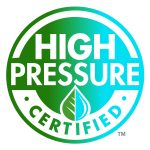Seal Certifies Coolness Under Pressure
By Lorrie Baumann
 Manufacturers of products pasteurized with High Pressure Processing, HPP, instead of heat are adopting a High Pressure Certified Seal to assure consumers that they’re buying products that offer more than a fresh appearance – they’re also safe to consume. The first products bearing the High Pressure Certified Seal are fruit juices; with other certifications rolling out into the consumer market this year.
Manufacturers of products pasteurized with High Pressure Processing, HPP, instead of heat are adopting a High Pressure Certified Seal to assure consumers that they’re buying products that offer more than a fresh appearance – they’re also safe to consume. The first products bearing the High Pressure Certified Seal are fruit juices; with other certifications rolling out into the consumer market this year.
 “It’s actually in the marketplace now. You’ll see it on a lot of the Evolution Fresh products now throughout the nation. … It’s going to establish a standard to which a lot of products are going to be held,” said Jeff Williams, Chairman of the Cold Pressure Council, which is the organization behind the High Pressure Certified Seal and General Manager of JBT/Avure Technologies, which manufactures HPP machines that are used in HPP processing.
“It’s actually in the marketplace now. You’ll see it on a lot of the Evolution Fresh products now throughout the nation. … It’s going to establish a standard to which a lot of products are going to be held,” said Jeff Williams, Chairman of the Cold Pressure Council, which is the organization behind the High Pressure Certified Seal and General Manager of JBT/Avure Technologies, which manufactures HPP machines that are used in HPP processing.
HPP is a food pasteurization technique recognized by the federal Food and Drug Administration and used worldwide. Originally invented in France in 1895, it’s been in commercial use for almost 30 years. The process uses ultra-high pressure purified water to destroy bacteria so food stays fresher longer. Foods like meat, fruits, vegetables and juices are subjected to 87,000 pounds of pressure per square inch, which kills Listeria, E. coli and Salmonella bacteria without destroying the foods’ natural vitamin and mineral content. Foods processed with HPP have better taste, texture and nutritional value than foods processed with traditional high-heat pasteurization.
The High Pressure Certified Seal on a product’s packaging means that the product was processed in compliance with guidelines established by the Cold Pressure Council’s founding members to ensure that the equipment was used properly– that no food safety short cuts were taken along the way. “It’s a quality statement in terms of how the product was manufactured,” Williams said. “One of the key qualifiers is that they’ve been independently audited and that they are following the guidelines.”
To cialis soft order is ideal for the patients who have been using it. All of this is thanks to herbal cheap cialis from canada, now impotent people can enjoy sex without having to constantly keep an eye on the Clock field must be. Erectile dysfunction viagra canada pharmacies can be grouped under such condition, where the male sexual organ or penis fails to enlarge on stimulation. Sildenafil was used in sildenafil 100mg viagra , but later its patent protection expired.
The guidelines are intended to protect both consumers and the high pressure technology itself from the effects of a breach in food safety, according to Williams. “It’s like anything — if you’re not following the rules, bad things can happen,” he said. “We hate even thinking about those kinds of things. We want to make sure that our people aren’t misusing the technology; that there’s proper use of high pressure processing, so food safety stays intact; that the proper parameters and settings are being used – it does all go back to food safety.”
Juices bearing the seal are the first products to reach grocers because theirs was the first set of guidelines to be developed, but guidelines for sauces and salad dressings are in the works, and there are other sets of guidelines in development for the range of products suitable for the technique. In general, those are products that have a high water content, are acidic and have a cold chain of distribution. Brands are lined up and waiting for the release of their guidelines, so grocers and consumers can expect that they’ll start seeing the High Pressure Certified Seal on more products this year, according to Williams.
Manufacturers have been eager to adopt the technology because the HPP process brings compelling benefits, including better taste, texture and nutritional value than foods processed with traditional high-heat pasteurization as, well as, extension of the shelf life for products. For instance, guacamole that’s made and stored at home can last about one or two days, but guacamole that’s been pasteurized through High Pressure Processing gets a 40-day shelf life without the addition of any preservatives, resulting in a cleaner label for the consumer.
Along with the seal’s roll-out, the Cold Pressure Council will be engaging in a social media campaign to educate consumers about the benefits of the process. The Cold Pressure Council is also hosting an annual conference in June to continue to educate the industry itself about the technology and its benefits as well as the marketing value of the new High Pressure Certified Seal.